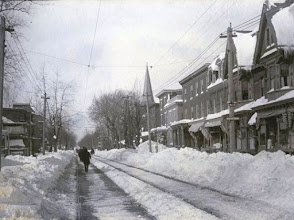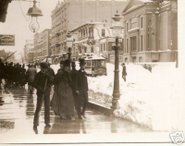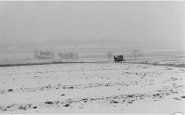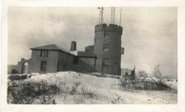Winter '11 / '12 - Arctic Oscillation - On the Cusp
 |
| NYC - East 46th St. near 2nd Ave. 16-JAN-65 |
The polar vortex (PV) has been wicked strong until recently when it weaken slightly during the on-going minor stratospheric warming. Minor warmings are not known for their association with PV-reversals...so there's little expectation this event will be reflected at the surface in the form of a negative AO.
What a difference a year makes. Last December/s monthly AO was the second lowest (-2.631) during the period of record which began in 1950. JAN-11 didn't stand out in the historical record (ranked 14th) but it was strongly negative. This winter...December was the polar opposite at +2.221. January is on-track to finish...not unexpectedly positive...around +1.
---
Below is a time-series of the AO on winter's cusp throughout the 60+ year period of record (1950 - 2011). The blue line is a trace of the daily AO index on 15-JAN. The dark red line is a a trace of the same data after applying a nine-point binomial filter. The filter removes low frequency noise and highlights decadal trends.
Not sure what this says about the AO on 15-JAN other than there is a discernible cycle every nine years or so. It does have an interesting comparison to the cycles found in the 30-DEC data.
























5 comments:
If I am reading the chart correctly then 1967, 1978 and 1993 all have positive values (on Jan 15). That's a faint sign of hope anyway. I expect February to be a much better winter month for the northeast U.S., not a prolonged snow drought. Feb 21-22 new moon MECS if we're lucky. -- Roger Smith
I hope you're right about FEB...esp. the periods around Preznits Day. It is climatologically the best month for mid-Atlantic snowfall.
If JAN/s AO turns out positive...which it most likely will...it works against a flip in FEB b/c the historical monthly index data shows DEC/s AO begets JAN/s AO and JAN/s AO begets FEB/s AO.
http://newxsfc.blogspot.com/2012/01/winter-11-12-arctic-oscillation-chi.html
The data peaks you note are a result of applying a '9-point binomial filter' which smooths out the yearly 'noise' to show decadal-scale signals / cycles...not the value of any one year.
The AO cycles...on average...every nine years (max = 11; min = 8). It's six years for the PNA.
I should overlay the two indexes to see where they amplify or cancel.
Thanks for that, I was looking at the actual data (blue) to get those values for the years in question. -- RS
Roger that...Roger.
So far your Winter '11/'12 Mild- Mild-Cold is following the script quite nicely.
Broken clock syndrome. -- RS
Post a Comment